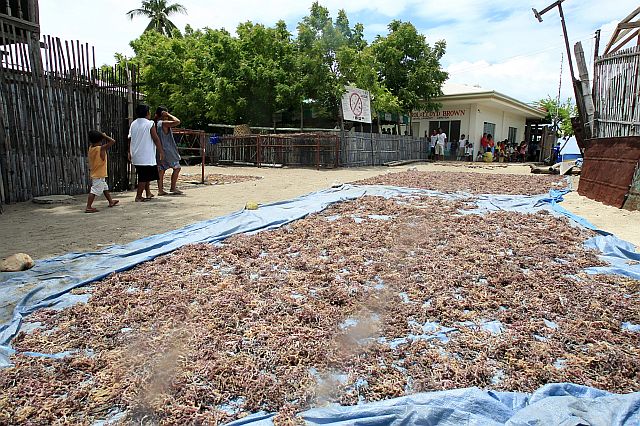
The market for carrageenan, which is extracted from seaweed such as those dried above, in the US is threatened with the decision of an agency to ban the product as a food additive there, says Maximo Ricohermoso, Seaweed Industry Association of the Philippines (SIAP) chairman (CDN FILE PHOTO).
Stakeholders in the Philippine seaweed industry will appeal the decision of the US-based National Organic Standards Board (NOSB) to ban the use of carrageenan as an additive in organic food.
Maximo Ricohermoso, chairman of the Seaweed Industry Association of the Philippines (SIAP), said yesterday that they would appeal the decision even as he expressed his dismay over the ruling.
Ricohermoso said they would also continue to inform the public to offset the negative publicity against carrageenan through their online magazine Hydrocolloid, and they would also continue to use the social media in spreading awareness about carrageenan.
In a 10–3 vote last Nov. 17, the NOSB, a body that advises the US Department of Agriculture, ruled to remove carrageenan from the list of “approved for use in organic food.”
The NOSB cited “health reasons” as a basis for banning the ingredient, as past researches have loosely linked the seaweed to digestive inflammation, evidence of which has been disputed by bodies like the World Health Organization (WHO) and even the US Food and Drug Administration, said Ricohermoso.
“If this is the reason they are using, then it would only be logical for them to say that carrageenan also has harmful effects when used in non-organic items,” Ricohermoso told Cebu Daily News in a phone interview.
He said this development will reinforce the notion perpetuated by competitors that carrageenan is “unsafe.”
Ricohermoso was referring to manufacturers of sodium carboxymethylcellulose or cellulose gum, which is a cheaper gum than carrageenan.
“I feel let down by this decision, but I also understand that competition has been threatened by our strong presence in the food additive business,” he said.
Carrageenan is a soluble fiber extracted from red seaweed and a food ingredient that has been used for hundreds of years across the globe, according to the Food Safety magazine.
It preserves texture, structure and stability when used as an ingredient in beverages, enabling the export of numerous shelf-stable products such as dairy beverages and protein-enriched drinks.
Seaweed, in general, is also used in foods such as soup, sushi wraps and spaghetti, as well as fertilizers and as animal feed.
Ricohermoso said the volume of carrageenan in organic food is relatively small, but he fears this will only further drive misconceptions on this ingredient.
He added that while the decision only covers organic food, there might also be collateral damage on non-food items.
The $250-million carrageenan industry, a third of which is driven by production in the Philippines, has seen a steady decline in the last two years due to bad publicity in the US.
With a 40 percent market share, Indonesia has emerged as the leading producer of carrageenan in the world today.
Ricohermoso said the Philippine seaweed industry stands to “lose” in the organic food sector because of the NOSB decision, but carrageenan has other non-food uses such as in toothpaste, shampoo, shoe polish and personal lubricants, among others.
The demand for seaweed worldwide has gone down in recent months due to the slowdown of the global market.
Ricohermoso said that in the Philippines, where 90 percent of seaweed harvest is exported, export figures have gone down by 20 to 30 percent in the first half of 2016.
The growth of the local seaweed industry has also been hampered by uncertain weather cycles such as the El Niño and several typhoons that will visit the Philippines.
Ricohermoso is also the president of MCPI Corp., one of the country’s biggest carrageenan manufacturers, based in Consolacion town, northern Cebu.
SIAP will also hold a national seaweed conference from Nov. 24 to 25 at the J Centre Mall in Mandaue City to discuss these pressing issues within the industry, from farming to application, and come up with solutions for these challenges.

